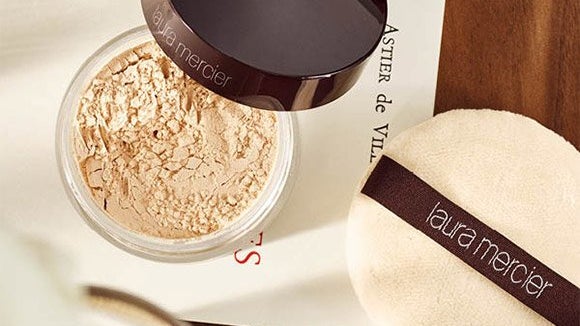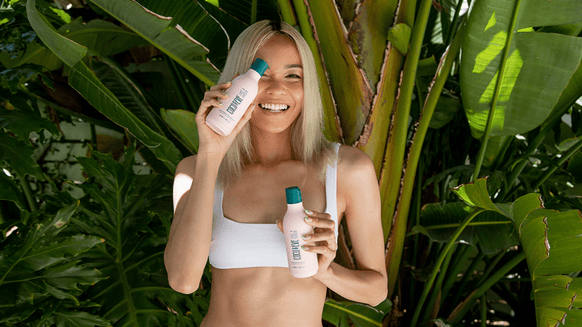An expert guide to vitamin-enriched skincare

Most of us are aware of the importance of eating a vitamin-rich diet to maintain good overall health. Therefore it's no surprise that to maintain good skin health, vitamins play a crucial role. "Vitamins are an essential part of any skincare regime to target individual skin concerns and protect our skin from both chronological and environment aging" says Elisha McVeigh, Elizabeth Arden digital training executive. She compares creating a skincare regime to a balanced diet to target the skin's unique needs: "I look for the essential vitamins and vitamin enriched skincare to achieve the best outcome for my skin".
Not sure where to start with your skincare 'diet'? We got the expert advice from Elisha and board-certified dermatologist, Dr Meg Sison on the best vitamins for each skin type and how to apply them for a healthy, glowing complexion.
How to incorporate vitamins into your skincare routine
When it comes to adding any new ingredient or skincare product into your routine, it's best to start slow. "Start with the lowest concentration and apply 2x a week" advises Dr Sison. "Make sure to patch test first before applying on large areas and always use broad-spectrum with sunscreen with SPF of at least 30 during the day" to avoid any reactions and protect the skin. With vitamins found in most moisturisers, serums, toners and sunscreens, the majority are safe to apply both morning and night, however Dr Sison warns to avoid using retinol in the mornings and only apply at night as it can make the skin more sensitive to UV rays. She advises consulting a dermatologist for guidance on your skincare routine.
How to choose the right skincare vitamin for your skin type
"To achieve healthy skin, it is best to use gentle skincare products based on your skin type, skin concerns and skin goals" advises Dr Sison. "Having a healthy lifestyle such as eating a balanced diet, having regular exercise and adequate sleep is also a must to keep our skin and our body healthy" she adds. Both Elisha and Dr Sison agree that you should choose your skincare based on your individual concerns:
Which vitamin is best for dull skin?
If you're looking to add radiance to your complexion, our experts recommend adding vitamins A and C into your routine. "Vitamin C has antioxidant and photoprotective properties and also helps with hyperpigmentation by inhibiting tyrosinase enzyme during melanin synthesis" explains Dr Sison.
"I use Elizabeth Arden Vitamin C Radiance Renewal Ceramide Capsules, an antioxidant, in the morning, not only to brighten my skin but protect my skin from environmental assaults which can cause pigmentation" says Elisha.
Which vitamin is best for dry skin?
For a boost of hydration and to replenish dry and dehydrated skin, Dr Sison recommends vitamin E due to its emollient properties. "Vitamin E has antioxidant, anti-inflammatory and emollient properties. It works best when combined with vitamin C and ferulic acid" she adds.
"Vitamin E found in Elizabeth Arden Advanced Ceramide Lift & Firm Day Cream SPF15 and Advanced Ceramide Lift & Firm Night Cream and throughout my regime hydrates and soothes my skin. Vitamin E prevents that all important moisture from escaping whilst offering another layer of protection with its antioxidant properties" explains Elisha.
Which vitamin is best for sensitive skin?
Making sure to follow Dr Sison's advice and adding any new products into your routine slowly, our experts recommend vitamin B3, otherwise known as niacinamide, for sensitive skin. "It has antioxidant properties, anti-inflammatory and photoprotective properties. It helps with hyperpigmentation because it inhibits melanosome transfer during synthesis of melanin. It also has skin barrier repair properties and it reduces sebum secretion in acne" explains Dr Sison. She advises to use a concentration lower than 2-5% to avoid irritation.
Which vitamin is best for oily and acne-prone skin?
For keeping blemishes at bay, our experts agree that vitamin A, as well as vitamin B3 are the ideal skincare mix. Only suitable for use in the evening, vitamin A or retinol has "anti-acne properties and also benefits those with post-acne marks (post-inflammatory hyperpigmentation and post-inflammatory erythema)" says Dr Sison. As mentioned, vitamin B3 (niacinamide) helps to regulate sebum production, which in turn helps to reduce blocked pores and breakouts.
Which vitamin is best for maturing skin?
Maturing skin can sometimes become more dull and begins to loose it's elasticity over time due to a natural decline in collagen production. Dr Sison recommends a mix of vitamins A, C and B3 to support the skin and keep it looking healthy and smooth. A type of retinoid, she advises using retinol at night due to its anti-ageing benefits. "Vitamin A (Retinol) should be used in the evening to prevent skin sensitivity when exposed to sunlight & to increase the efficiency of the product" warns Elisha.
"I love to use the Elizabeth Arden Retinol Ceramide Capsules Line Erasing Night Serum. It is a non-drying formula that improves the texture & tone of my skin whilst diminishing discoloration" she adds.

Working with brands at LOOKFANTASTIC for over two years I have developed my knowledge of all things beauty from key skincare concerns to niche makeup tricks and haircare hacks. I have a major passion for finding effective solutions that are easily accessible to everyone so that we can all achieve our best, glowing complexion.















